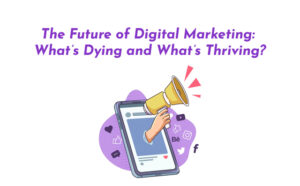I. Introduction
The digital marketing landscape is a powerful force, capable of shaping brand perceptions, influencing consumer behavior, and driving economic growth. However, with this immense power comes a significant responsibility – the ethical conduct of marketing practices in the digital realm. As technology evolves and user expectations shift, navigating the moral maze of digital marketing becomes increasingly complex. This article delves into the core ethical considerations that digital marketers must confront, fostering a deeper understanding of responsible practices and their impact on building trust and long-term success.
A. The Power and Peril of Digital Marketing
Digital marketing encompasses a vast array of online strategies, from targeted advertising and social media engagement to content marketing and search engine optimization. Its effectiveness lies in its ability to reach vast audiences with laser precision, personalize messaging, and track results with unprecedented granularity. However, this very power can be misused, leading to privacy violations, manipulative tactics, and the spread of misinformation.
B. Defining Ethical Boundaries in a Dynamic Landscape
Establishing clear ethical boundaries in the ever-evolving digital landscape requires constant vigilance and adaptation. As new technologies emerge and user behavior patterns change, ethical considerations must be continuously reevaluated and refined. This necessitates a commitment to transparency, user trust, responsible data handling, and ethical content creation, ensuring that digital marketing practices align with moral principles and contribute to a positive online environment.
II. Transparency and User Trust
A. Demystifying Data Collection Practices
In the digital age, data is the lifeblood of marketing. User information is collected through various means, including website cookies, online forms, social media interactions, and even browsing behavior. However, the opaque nature of data collection practices often leaves users feeling confused and potentially violated. Building trust hinges on transparency. Clearly communicating the types of data collected, the purpose of its use, and user control over their information are fundamental ethical obligations.
B. Building Trust Through Clear Communication and Consent
Transparency alone is insufficient. Obtaining explicit and informed consent for data collection and usage is crucial. This requires providing users with clear and easily understandable information about how their data will be used, who will have access to it, and how they can withdraw their consent at any time. Building trust through open communication and empowering users with control over their data fosters a more ethical and sustainable digital marketing ecosystem.
III. Responsible Targeting and Personalization
A. Avoiding Algorithmic Bias and Discrimination
Digital marketing algorithms are powerful tools for targeting specific audiences. However, these algorithms can perpetuate biases and lead to discriminatory practices if not carefully monitored. It is imperative to ensure that targeting algorithms are free from biases based on factors like race, gender, religion, or socioeconomic status. Ethical digital marketing necessitates responsible use of algorithms that promote inclusivity and avoid perpetuating harmful stereotypes.
B. Personalization for Value, Not Manipulation
Personalization, the tailoring of content and messaging to individual user preferences, is a cornerstone of modern digital marketing. However, the line between valuable personalization and manipulative tactics can be easily blurred. Ethical considerations demand that personalization be used to enhance user experience, provide relevant information, and offer genuine value. Exploiting user data for manipulative purposes, such as playing on emotional vulnerabilities or creating a sense of urgency solely to drive sales, undermines trust and ethical marketing principles.
You would like to read: Unleashing The Future: The Symbiosis Of AI And Personalization In Marketing
IV. Ethical Content Creation and Brand Messaging
A. Authenticity and Avoiding Misinformation
In the age of information overload, authenticity and the responsible dissemination of information are paramount. Digital marketers have an ethical obligation to create content that is accurate, well-researched, and free from misleading claims or deceptive practices. Fabricating information, spreading fake news, or engaging in clickbait tactics not only erodes trust but also contributes to a polluted online environment.
B. Social Responsibility and Avoiding Harmful Stereotypes
Digital marketing content has the power to shape social perceptions and influence cultural norms. Ethical considerations necessitate promoting social responsibility and avoiding the perpetuation of harmful stereotypes based on race, gender, sexual orientation, or any other protected characteristic. Responsible content creators strive to represent diversity authentically, challenge harmful biases, and contribute to a more inclusive and equitable online space.
V. Data Privacy and Security
A. Respecting User Information and Data Rights
User data is a valuable asset, and with it comes significant responsibility. Digital marketers must respect user privacy and uphold data rights. This includes implementing robust security measures to protect sensitive information from unauthorized access, breaches, or misuse. Additionally, providing users with clear control over their data, including the ability to access, rectify, or erase their information, is essential for ethical data handling practices.
B. Implementing Robust Security Measures
Data breaches and cyberattacks pose a significant threat to user privacy and information security. Digital marketers must prioritize robust security measures to safeguard user data. This includes employing strong encryption protocols, regularly updating software and systems, and implementing access controls to limit data exposure. Additionally, fostering a culture of cybersecurity awareness within organizations and educating users about online safety practices are crucial aspects of responsible data security.
VI. The Ethical Use of Influencer Marketing
A. Authenticity and Disclosure of Sponsorships
Influencer marketing has become a powerful tool for brand promotion and audience engagement. However, ethical considerations demand transparency and authenticity in influencer partnerships. Disclosing sponsorships clearly and avoiding misleading endorsements are fundamental ethical obligations. Influencers have a responsibility to their audience to be transparent about their relationships with brands and to promote products or services they genuinely believe in and use themselves.
You would like to read: What Are The Biggest Trends In Influencer Marketing?
B. Avoiding Misleading Endorsements and Deception
Fabricating positive reviews, manipulating engagement metrics, or engaging in deceptive marketing practices not only damage brand reputation but also erode trust in the influencer marketing ecosystem. Ethical considerations necessitate avoiding any form of misleading endorsements or deceptive tactics. Influencers must maintain their authenticity and integrity, focusing on genuine recommendations and fostering trust with their audience.
VII. The Evolving Landscape of Ethical Considerations
A. Keeping Pace with Technological Advancements
The digital landscape is constantly evolving, with new technologies like artificial intelligence, virtual reality, and the metaverse emerging rapidly. As these technologies are integrated into marketing practices, new ethical considerations will inevitably arise. Keeping pace with technological advancements and proactively addressing the ethical implications of emerging technologies are crucial for responsible digital marketing practices in the future.
B. Adapting Ethical Frameworks for Emerging Technologies
Ethical frameworks for digital marketing must be adaptable and evolve alongside technological advancements. This necessitates ongoing dialogue between stakeholders, including marketers, policymakers, and technology developers, to establish clear guidelines and best practices for the ethical use of emerging technologies in the marketing domain. By proactively addressing ethical concerns and fostering responsible innovation, we can ensure that the digital marketing landscape remains a force for good, promoting transparency, user trust, and a more ethical online environment.
VIII. Conclusion: Building a Sustainable and Ethical Digital Future
Navigating the ethical considerations of digital marketing is an ongoing journey that requires constant vigilance, adaptation, and a commitment to responsible practices. By prioritizing transparency, user trust, responsible data handling, and ethical content creation, digital marketers can contribute to building a more sustainable and ethical digital future. This future necessitates ongoing collaboration, proactive innovation, and a shared commitment to upholding moral principles in the ever-evolving digital landscape.










